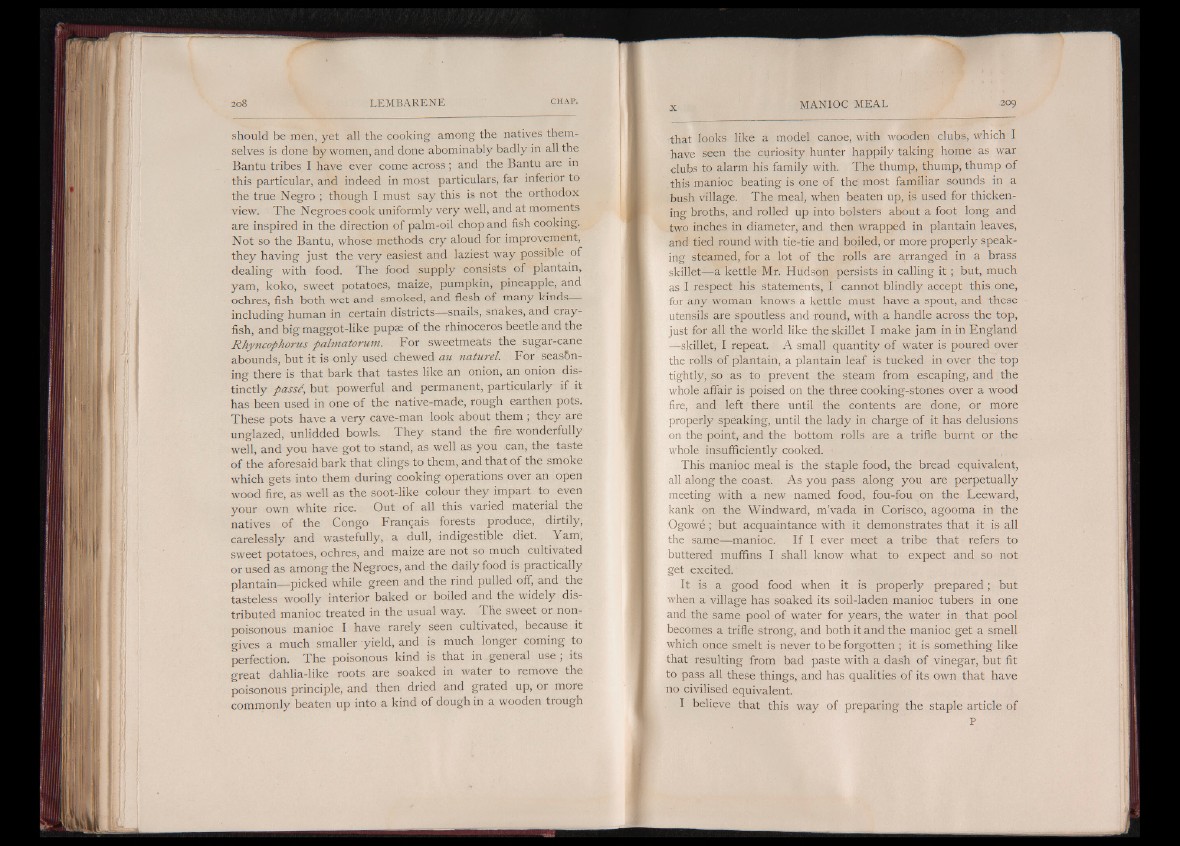
should be men, yet all the cooking among the natives themselves
is done by women, and done abominably badly in all the
Bantu tribes I have ever come across ; and the Bantu are in
this particular, and indeed in most particulars, far inferior to
the true Negro ; though I must say this is not the orthodox
view. The Negroes cook uniformly very well, and at moments
are inspired in the direction of palm-oil chop and fish cooking.
Not so the Bantu, whose methods cry aloud for improvement,
they having just the very easiest and laziest way possible of
dealing with food. The food supply consists of plantain,
yam, koko, sweet potatoes, maize, pumpkin, pineapple, and
ochres, fish both wet and smoked, and flesh of many kinds
including human in certain districts— snails, snakes, and crayfish,
and big maggot-like pupae of the rhinoceros beetle and the
Rhyncophorus palmatorum. For sweetmeats the sugar-cane
abounds, but it is only used chewed au naturel. For seasoning
there is that bark that tastes like an onion, an onion distinctly
passé; but powerful and permanent, particularly if it
has been used in one of the native-made, rough earthen pots.
These pots have a very cave-man look about them ; they are
unglazed, unlidded bowls. They stand the fire wonderfully
well, and you have got to stand, as well as you can, the taste
of the aforesaid bark that clings to them, and that of the smoke
which gets into them during cooking operations over an open
wood fire, as well as the soot-like colour they impart to even
your own white rice. Out of all this varied material the
natives of the Congo Français forests produce, dirtily,
carelessly and wastefully, a dull, indigestible diet. Yam,
sweet potatoes, ochres, and maize are not so much cultivated
or used as among the Negroes, and the daily food is practically
plantain— picked while green and the rind pulled off, and the
tasteless woolly interior baked or boiled and the widely distributed
manioc treated in the usual way. The sweet or non-
poisonous manioc I have rarely seen cultivated, because it
gives a much smaller yield, and is much longer coming to
perfection. The poisonous kind is that in general use ; its
great dahlia-like roots are soaked in water to remove the
poisonous principle, and then dried and grated up, or more
commonly beaten up into a kind of dough in a wooden trough
that looks like a model canoe, with wooden clubs, which I
have seen the curiosity hunter happily taking home as war
clubs to alarm his family with. The thump, thump, thump of
this manioc beating is one of the most familiar sounds in a
bush village. The meal, when beaten up, is used for thickening
broths, and rolled up into bolsters about a foot long and
two inches in diameter, and then wrapped in plantain leaves,
and tied round with tie-tie and boiled, or more properly speaking
steamed, for a lot of the rolls are arranged in a brass
skillet— a kettle Mr. Hudson persists in calling i t ; but, much
as I respect his statements, I cannot blindly accept this, one,
for any woman knows a kettle must have a spout, and these
utensils are spoutless and round, with a handle across the top,
just for all the world like the skillet I make jam in in England
—skillet, I repeat. A small quantity of water is poured over
the rolls of plantain, a plantain leaf is tucked in over the top
tightly, so as to prevent the steam from escaping, and the
whole affair is poised on the three cooking-stones over a wood
fire, and left there until the contents are done, or more
properly speaking, until the lady in charge of it has delusions
on the pointy and the bottom rolls are a trifle burnt or the
whole insufficiently cooked. ’
This manioc meal is the staple food, the bread equivalent,
all along the coast. As you pass along you are perpetually
meeting with a new named food, fou-fou on the Leeward,
kank on the Windward, m’vada in Corisco, agooma in the
Ogowe; but acquaintance with it demonstrates that it is all
the same-femanioc. If I ever meet a tribe that refers to
buttered muffins I shall know what to expect and so not
get excited.
It is a good food when it is properly prepared; but
when a village has soaked its soil-laden manioc tubers in one
and the same pool of water for years, the water in that pool
becomes a trifle strong, and both it and the manioc get a smell
which once smelt is never to be forgotten ; it is something like
that resulting from bad paste with a dash of vinegar, but fit
to pass all these things, and has qualities of its own that have
no civilised equivalent.
I believe that this way of preparing the staple article of
P